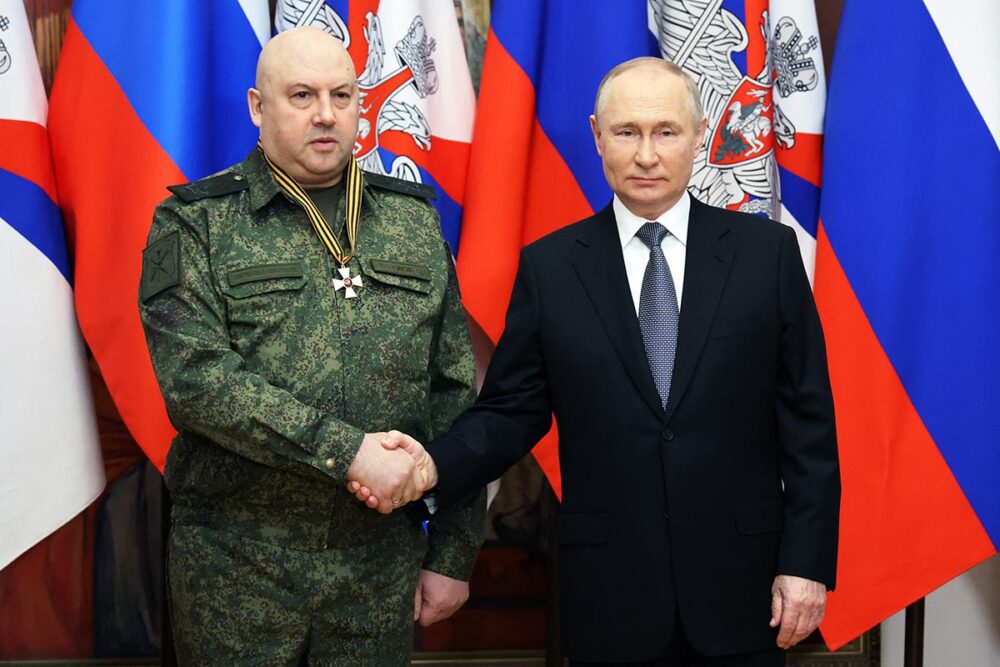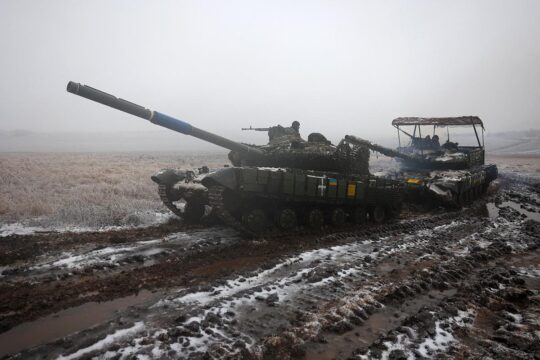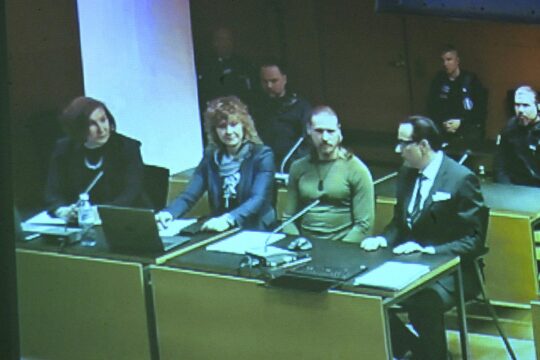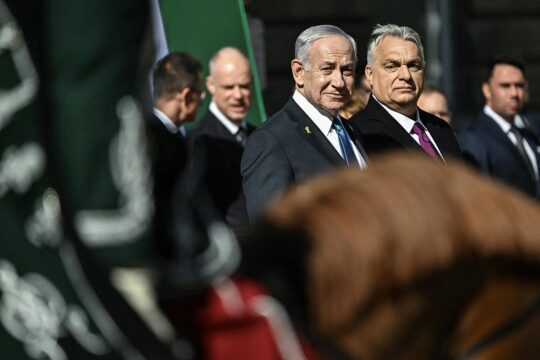JUSTICE INFO: The International Criminal Court (ICC) has issued arrest warrants against two high-ranking officers of the Russian for alleged crimes in Ukraine. Who are they?
SERGEY VASILIEV: Sergey Kobylash is a Lieutenant General in the Russian Armed Forces, and he was, during that campaign of strikes against the energy infrastructure of Ukraine, the commander of the long-range, aviation of the Aerospace Force. So he is a hot shot, a high-level top-ranking commander. I think he was also born in Odessa, Ukraine, which is quite remarkable.
The second half of this duo is Viktor Sokolov. He is an admiral in the Russian Navy, and he was, at the time of the events, the commander of the Black Sea Fleet. There were actually rumours circulating around September last year that he perished, as a result of the Ukrainian strike on the headquarters of the Black Sea Fleet, in Sevastopol. The Russian authorities have denied it. There were other rumours, I think in the [Russian] Zed Patriotic Telegram channels that he had been removed as the commander of the Black Sea Fleet last month, in view of the fact that the majority of ships of the Black Sea Fleet were actually damaged and sank as a result of Ukrainian attacks. It seems that there was some displeasure about his performance. He is not the head of the Black Sea Fleet now. But again, it is not confirmed because there was no official notice.
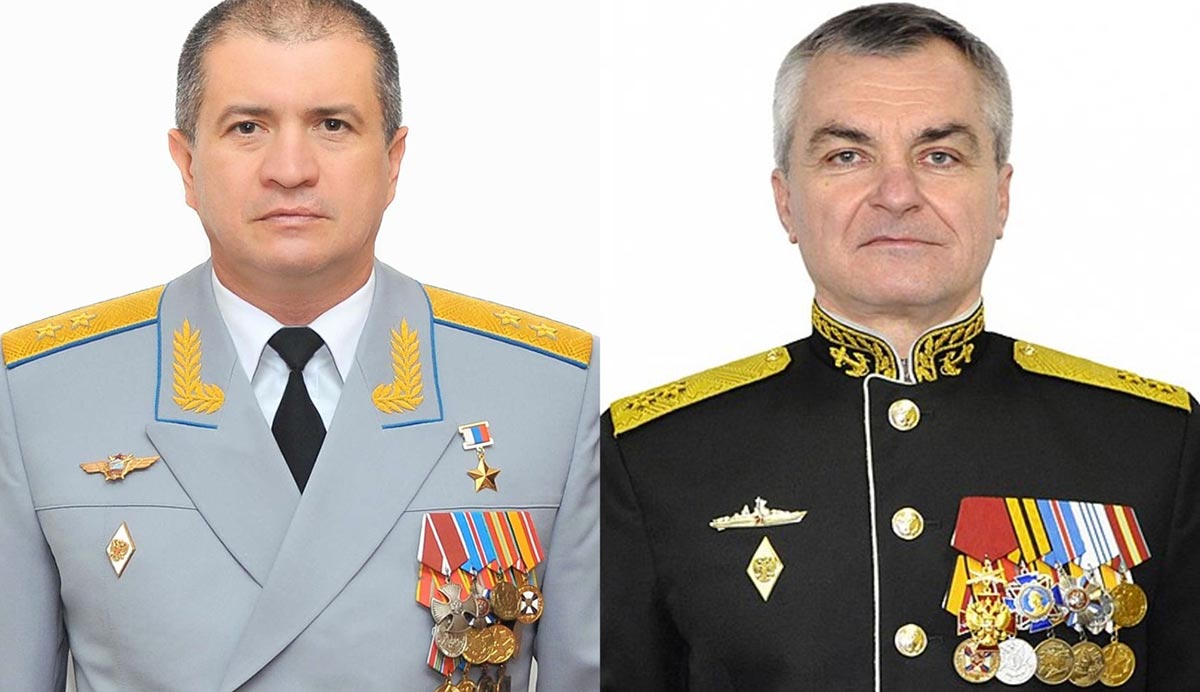
So we're dealing here with two top military commanders of the Russian Federation. One name that is conspicuous by its absence – and that surprises me a little bit – is that of Sergey Surovikin. I really expected him also to feature in the next series of arrest warrants of the ICC, especially in relation to this campaign of destruction of electricity infrastructure. Surovikin was appointed commander in chief of the Russian army in Ukraine on the 8th of October, 2022. So literally on the same day or the next day this campaign of strikes against the power grids, and substations, started. To me, it seemed like he was the mastermind behind this change of tack, this strategy of attacking the power infrastructure of Ukraine.
He was later appointed as the head of the Coordinating Committee for Air Defence, under the Council of Defence Ministers. In that capacity he even visited Algeria in September 2023. So he's still around. I'm just wondering whether we could still expect another warrant to be announced any time soon, or perhaps there is a warrant, but it is sealed. For now, it's only two people.
Russian President Vladimir Putin is already under an arrest warrant but there's no Minister of Defence, deputy Minister of Defence or anyone at this political level as well. How do you see this?
Surovikin would be the next level, one level up. But of course, this ladder has more than just one step. Ultimately, it was under Putin’s authority, as the Supreme Commander in Chief, that those attacks were committed. But I think the approach here, is to build cases bottom up. It does not preclude the prosecutor from applying for further arrest warrants. For now, this is the level that I suppose had the most credible and sufficient evidence in order to meet the standards of « reasonable grounds to believe ». Once those cases are out there - I don't really expect arrests to take place anytime soon - we might expect further cases perhaps involving higher placed individuals, such as [Minister of Defence] Sergey Shoigu, Surovikin, [Army Chief of Staff and Deputy Minister of Defence] Valery Gerasimov and ultimately, Putin.
I think the answer to your question is: is there a prosecutorial strategy? With the evidence they had they could link those two individuals to a number of specific, attacks or incidents in which there were dozens or perhaps even hundreds of victims. It is very important to bring cases that have sufficient promise of conviction. But in the future further cases could be brought and I believe should be brought.
The Ukrainians themselves may have also brought arrest warrants against these individuals. Would the evidence have been collected by them, then transferred over to the ICC Office of the Prosecutor, where they'd pick and choose what they want?
Yes, I suppose there is division of labour. There is a cooperation arrangement between the ICC Office of the Prosecutor and Ukraine’s Office of the Prosecutor General. ICC Prosecutor Karim Khan and the prosecutor general of Ukraine Andrey Kostin have a good working relationship. There is indeed a criminal case pending in Ukraine at least against Kobylash concerning the initiation of, waging of aggressive war, and the attack against the territorial integrity and sovereignty of Ukraine. I'm not sure what the scope of that case is and whether it also covers war crimes. Of course, the ICC would not have jurisdiction over the crime of aggression in Ukraine. So I also see how that line could be drawn: For example, the Office of the Prosecutor General of Ukraine could decide to provide evidence to the ICC for them to build a war crimes case, while pursuing domestically a case on the aggressive war.
We know some of the details of what is being alleged. As regard to war crimes, it's the effects of those attacks on civilians that is being suggested to be a war crime. What about crimes against humanity?
Both, individuals were charged with basically three crimes. Two war crimes and one crime against humanity. When it comes to war crimes, it's the crime of directing attacks against civilian objects that are not military targets. You can think of residential buildings, for example, or kindergartens, or schools, which do not form military objectives. The second war crime is causing excessive, incidental harm to civilians or damaging civilian objects. It's basically about causing excessive collateral damage – attacks that were targeting military objects, the effects of which would cause loss of civilian life or damage to civilian objects that was excessive in relation to the concrete, direct military advantage. These attacks were carried out deliberately, in the knowledge that such an excessive damage would ensue. And therefore, it also amounts to a war crime.
You always need to prove intent: that such an attack was intentionally launched. In the case of the second war crime, you also need to show that the person knew that such an attack would result in excessive incidental harm, which can be quite difficult. It relates to the subjective aspect of the crime, and it can be quite tricky.
How do they prove that?
Mostly, intent can be inferred from some other elements, for example from the circumstances. Surrounding a specific incident there might be communication, maybe intercepted phone calls [that show] that the intention was actually to ignore any potentially excessive damage to civilians and to civilian objects. A line of defence could be that there was still a clear military advantage to be achieved by launching an attack against that object, and that it was not so clear that the excessive damage would outweigh the military advantage. Commanders can always put forth the defence that they had grounds to believe that the military advantage would be concrete and direct, and therefore they were not precluded by international humanitarian law from launching such a risky attack, even in the knowledge that it would cause some damage to the civilians, or to civilian objects. We should presume that the prosecutor has a strong case.
Is it possible that they have “insider witnesses”?
Yes, I do not exclude that there are some defectors, some insider witnesses from within the Russian security services or even the army who were prepared to provide evidence against those individuals or against any other unnamed individuals that we might see mentioned in any future arrest warrants. But it's mostly speculation. We do not really know on what grounds those charges were chosen, and it was a deliberate decision not to disclose the actual content of the arrest warrants. So we actually do not know what exact incidents we are talking about. It's only about the campaign that took place between October 2022 and March 2023, that's what we know. I started to go through my old tweets, [to see] what kind of incidents it would relate to. And a bunch of incidents could potentially qualify and fall within this actual substratum of the charges. For example, there was an attack in Dnipro, in Kyiv, in Kharkiv.
What is absolutely clear is that those charges cannot be all-encompassing and comprehensive. They will not be covering every single attack.
As regard to the charge of crime against humanity, some have already described it as a “bold” move, because it requires that the attack be systematic or widespread.
I do not really believe that it was bold. I think it was a natural move to charge crimes against humanity as well. Although perhaps we did not expect it to be done in connection with the attacks against the energy infrastructure of Ukraine. But if you consider the context in which the crimes were committed and the nature of that attack in the execution of a state policy, obviously the attack was, you know, widespread and systematic. So, it is not highly surprising that other inhumane acts as crimes against humanity were actually included in those [charges].
You need to consider also the impact on the civilians that those attacks caused – the destruction of essential civilian infrastructures like power stations, substations that were also meant to service the civilian population in Ukraine during a pretty harsh winter. It necessarily went beyond "mere" war crimes because the intention was also to make the civilians suffer. I think the calculation behind this was that if the Russian army continues with these systematic, widespread attacks, then the civilian population might rise up against the Kyiv regime, and say, ‘well, we really have to find a political solution, [and] if we need to give away those territories, it’s fine with us, just please stop this war because we cannot go on like that’. The civilian population was chosen as an instrument. So, in that sense, because it was clearly amounting to an attack against the civilian population, it is quite predictable and fully understandable to charge that as other inhumane acts as crimes against humanity. It is a bit of a “marginal” charge here, because if you think about crimes in the occupied territories where Russian troops were stationed, that would be a textbook example of crimes against humanity. I'm talking here about murder, unlawful detention, the deprivation of liberty, torture, and rape. I do still expect those crimes to be charged in the future. The “big” crimes against humanity case is still to come. This is just a notice, like a precursor to what we can expect.
If you look at the first set of charges on the deportation of children, then this set of charges on the attack on civilian infrastructure, it gives the impression of a prosecutor who is very careful, but very deliberately choosing ‘signature’ events and crimes, like following a long strategic plan with, at some point, something about what's happening in the occupied territories. Do you think there is such a plan?
I'm absolutely sure that there is a well-thought-through strategy there, knowing who leads the Ukraine team. Prosecutor Brenda Hollis is a very experienced, seasoned, competent, prosecutor, with extensive experience in International Criminal Tribunals. We unfortunately don't know much about the Office of the Prosecutor's investigative, case prioritisation strategy, specifically in relation to the situation in Ukraine. We can only glean some hints from the prosecutor's public statements and communications.
After the fourth visit by the prosecutor to Ukraine, the prosecutor issued a statement that referred clearly to children being the forgotten victims of the conflict. And ten days later, we got the bombshell news that [the Court] had issued arrest warrants [against Putin and Maria Lvova-Belova, his commissioner for children rights for the unlawful deportation and transfer of children from Ukraine]. In the same statement, he also mentioned a meeting with Kostin, where they discussed the series of attacks on critical civilian infrastructure, and [their] collective commitment to ensure that such acts were going to be fully investigated and that the people responsible, will or should be held to account. So this was a very clear indication as to what to expect. It took basically one year to get the warrants in relation to the destruction of the infrastructure of Ukraine.
In case of Putin and Belova it was much easier because of that infamous video where they were simply discussing how exactly they were doing this and why it was so important. You wouldn't find such an exhibit A in the case of attacks on the infrastructure. So, the investigation had to be done. But I can't say that it was a surprising outcome. It was clear that the Office of the Prosecutor was at it. It was really intending to pursue that strategy.
In the same way we can draw some inferences as to the potential future cases. We could just read previous statements by the prosecutor very intensively. He also visited various sites in the Kyiv Oblast. And that was all about the killing of civilians which was brought to light after the Russian troops withdrew from the Kyiv Oblast in early April 2022. I would not be surprised if the crimes in the [de]occupied territories were to form a central part of the future cases that they might bring. And here, of course, the scope of possibilities is really extensive, in terms of locations. It’s Kiev Oblast, it is Kherson Oblast, it is Zaporizhia. those localities that were under the [temporary Russian] occupation. It became clear that massive crimes against humanity, and war crimes were committed by the troops. So, I expect the Office of the Prosecutor to be investigating those incidents. There would need to be some division of labour there because the Prosecutor General’s Office of Ukraine is also doing a number of those cases. So, I'm curious to see how that division of tasks would work in practice, what kind of understanding has been reached. There are many options as to how they could divide the labour amongst themselves. Like with the destruction of the Khakovka dam, with major environmental consequences.
In the prosecutor's press statement following the arrest warrants, there is the idea that making these arrest warrants public for these particular types of crimes – the illegal destruction of civilian objects - should reverberate amongst anyone who is committing or thinking about committing these kinds of crimes. This was a message meant to go far beyond Ukraine, to the Israel-Palestine conflict in particular, wasn't it?
I believe so, because very deliberately, the prosecutor underlined that this is a notice to state actors and non-state actors, in Ukraine and outside Ukraine. He even engaged in this rhetorical method of repetition in order to emphasise how important it is for everyone to take notice. It is indeed a warning not only to the warring parties in Ukraine. It is also directed at the parties to the ongoing conflict in Gaza, in particular Israeli Defence Forces and Hamas fighters. I think this was the intention behind this statement.
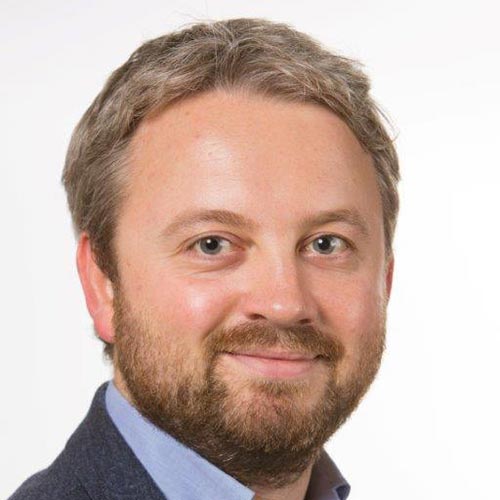
Sergey Vasiliev is an Associate Professor at the Department of Criminal Law, Amsterdam Law School. He also serves as the (inaugural) director of the Amsterdam Center for Criminal Justice and the Academic Director of the LL.M. International Criminal Law.


